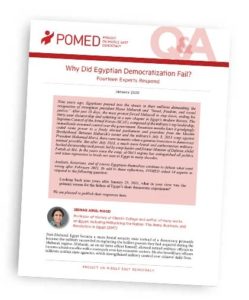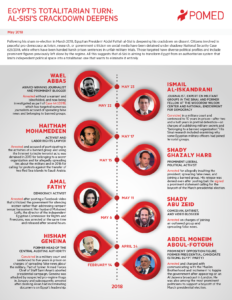 On the ninth anniversary of the Tahrir Square uprising, the Project on Middle East Democracy* invited fourteen experts to respond to the question, “Why Did Egyptian Democratization Fail?”
On the ninth anniversary of the Tahrir Square uprising, the Project on Middle East Democracy* invited fourteen experts to respond to the question, “Why Did Egyptian Democratization Fail?”
Forces within Egypt that wanted democratization failed to unify behind a plan for the initial phase of democratic transition in early 2011, allowing the antidemocratic military leadership (the Supreme Council of the Armed Forces, or SCAF) to outmaneuver them, argues Michele Dunne, Senior Fellow and Director of the Middle East Program at the Carnegie Endowment for International Peace.
Liberal, leftist, and Islamist political forces unified during the 18-day uprising around the demand for Mubarak to leave, but none of them had thought much about what should happen next, she observes:
The SCAF, by contrast, moved quickly, presenting a plan for limited constitutional amendments barely two weeks after Mubarak was ousted and getting Muslim Brotherhood support. This set in place a dynamic—political forces struggling against one another and losing public support, while the military played each against the other—that caused the Egyptian effort at democracy to fail from the outset.

Project on Middle East Democracy
Read the Expert Q&A with additional responses from:
- Zeinab Abul-Magd
- Khalil Al-Anani
- Nagwan Alashwal
- Abdelrahman Ayyash
- Sahar Aziz
- Steven Cook
- Ezzedine Choukri Fishere
- Hafsa Halawa
- Shadi Hamid
- Michael Hanna
- Bahey eldin Hassan
- Amy Hawthorne
- William Quandt
*A partner of the National Endowment for Democracy. PDF available here.







